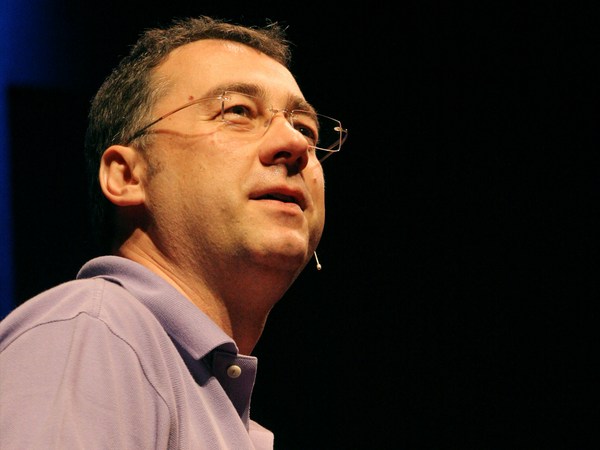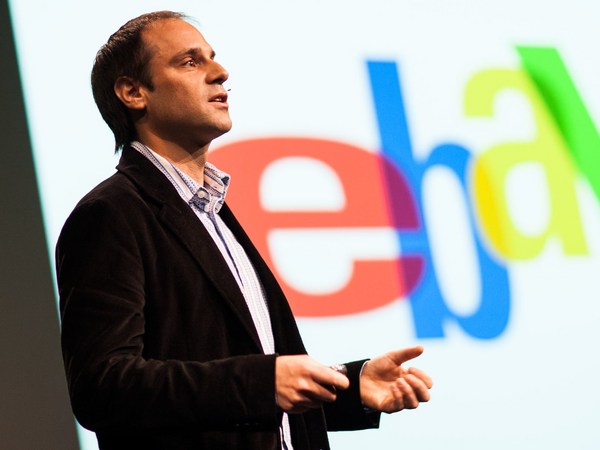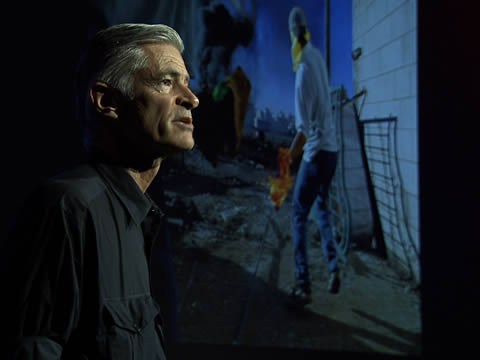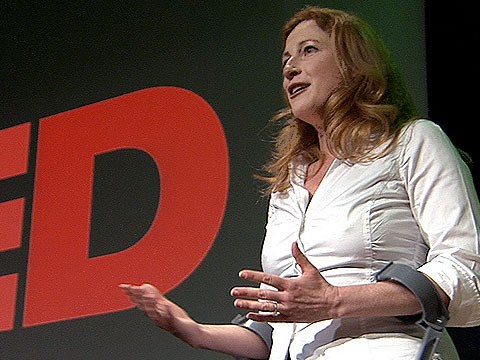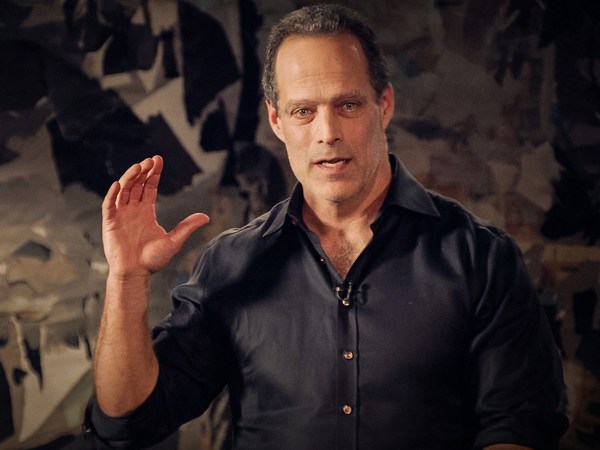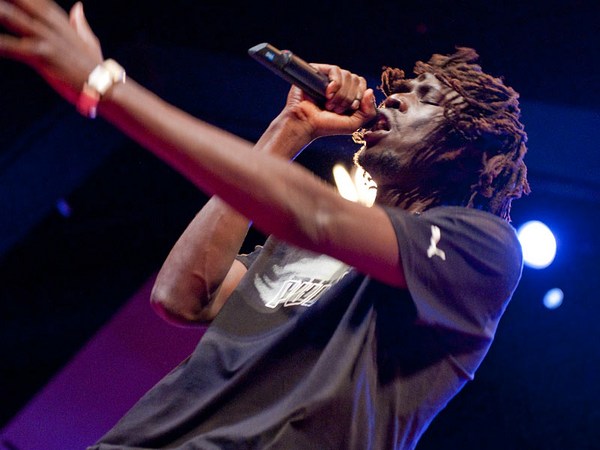I love trees, and I'm very lucky, because we live near a wonderful arboretum, and Sundays, usually, I'd go there with my wife and now, with my four-year-old, and we'd climb in the trees, we'd play hide and seek. The second school I was at had big trees too, had a fantastic tulip tree, I think it was the biggest in the country, and it also had a lot of wonderful bushes and vegetation around it, around the playing fields.
One day I was grabbed by some of my classmates, and taken in the bushes -- I was stripped; I was attacked; I was abused; and this came out of the blue. Now, the reason I say that, because, afterwards, I was thinking -- well, I went back into the school -- I felt dirty; I felt betrayed; I felt ashamed, but mainly -- mainly, I felt powerless. And 30 years later I was sitting in an airplane, next to a lady called Veronica, who came from Chile, and we were on a human rights tour, and she was starting to tell me what it was like to be tortured, and, from my very privileged position, this was the only reference point that I had. And it was an amazing learning experience because, for me, human rights have been something in which I had, you know, a part-time interest, but, mainly, it was something that happened to other people over there.
But I got a phone call from Bono in 1985 and, as you know, he's a great singer, but he's a magnificent hustler, and --
(Laughter) --
a very hard guy to say no to, and he was saying, you know, just after I'd done the Biko song, we're going to do a tour for Amnesty, you have to be on it, and really that was the first time that I'd been out and started meeting people who'd watched their family being shot in front of them, who'd had a partner thrown out of an airplane into an ocean, and suddenly this world of human rights arrived in my world, and I couldn't really walk away in quite the same way as before.
So I got involved with this tour, which was for Amnesty, and then in '88 I took over Bono's job trying to learn how to hustle. I didn't do it as well, but we managed to get Youssou N'Dour, Sting, Tracy Chapman, and Bruce Springsteen to go 'round the world for Amnesty, and it was an amazing experience. And, once again, I got an extraordinary education, and it was the first time, really, that I'd met a lot of these people in the different countries, and these human rights stories became very physical, and, again, I couldn't really walk away quite so comfortably.
But the thing that really amazed me, that I had no idea, was that you could suffer in this way and then have your whole experience, your story, denied, buried and forgotten. And it seemed that whenever there was a camera around, or a video or film camera, it was a great deal harder to do -- for those in power to bury the story. And Reebok set up a foundation after these Human Rights Now tours and there was a decision then -- well, we made a proposal, for a couple of years, about trying to set up a division that was going to give cameras to human rights activists. It didn't really get anywhere, and then the Rodney King incident happened, and people thought, OK, if you have a camera in the right place at the right time, or, perhaps, the wrong time, depending who you are, then you can actually start doing something, and campaigning, and being heard, and telling people about what's going on.
So, WITNESS was started in '92 and it's since given cameras out in over 60 countries. And we campaign with activist groups and help them tell their story and, in fact, I will show you in a moment one of the most recent campaigns, and I'm afraid it's a story from Uganda, and, although we had a wonderful story from Uganda yesterday, this one isn't quite so good. In the north of Uganda, there are something like 1.5 million internally displaced people, people who are not refugees in another country, but because of the civil war, which has been going on for about 20 years, they have nowhere to live. And 20,000 kids have been taken away to become child soldiers, and the International Criminal Court is going after five of the leaders of the -- now, what's it called? I forget the name of the of the army -- it's Lord's Resistance Army, I believe -- but the government, also, doesn't have a clean sheet, so if we could run the first video.
(Music) Woman: Life in the camp is never simple. Even today life is difficult. We stay because of the fear that what pushed us into the camp ... still exists back home. Text: "Between Two Fires: Torture and Displacement in Northern Uganda" Man: When we were at home, it was Kony's [rebel] soldiers disturbing us. At first, we were safe in the camp. But later the government soldiers began mistreating us a lot.
(Chanting) Jennifer: A soldier walked onto the road, asking where we'd been. Evelyn and I hid behind my mother. Evelyn: He ordered us to sit down, so we sat down. The other soldier also came. Jennifer: The man came and started undressing me. The other one carried Evelyn aside. The one who was defiling me then left me and went to rape Evelyn. And the one who was raping Evelyn came and defiled me also. Man: The soldiers with clubs this long beat us to get a confession. They kept telling us, "Tell the truth!" as they beat us. Woman: They insisted that I was lying. At that moment, they fired and shot off my fingers. I fell. They ran to join the others ... leaving me for dead.
(Music) Text: Uganda ratified the Convention Against Torture in 1986. Torture is defined as any act by which severe pain of suffering, whether physical or mental, is intentionally inflicted by a person acting in an official capacity to obtain information or a confession, to punish, coerce or intimidate.
Peter Gabriel: So torture is not something that always happens on other soil. In my country, it was -- we had been looking at pictures of British soldiers beating up young Iraqis; we've got Abu Ghraib; we've got Guantanamo Bay. I had a driver on my way to Newark Airport, and he told me a story that, in the middle of the night, 4 a.m., he'd been taken out of his home in Queens -- taken to a place in the Midwest, that he was interrogated and tortured and returned to the street four weeks later, because he had the same -- he was Middle Eastern, and he had the same name as one of the 9/11 pilots, and that may or may not be true -- I didn't think he was a liar, though.
And, I think, if we look around the world, as well as the polar ice caps melting, human rights, which have been fought for, for many hundreds of years in some cases, are, also, eroding very fast, and that is something that we need to take a look at and, maybe, start campaigning for. I mean, here, too, one of our partners was at Van Jones and the Books Not Bars project -- they have managed, with their footage in California to change the youth correction systems employed, and it's much -- much -- I think, more humane methods are being looked at, how you should lock up young kids, and that's questionable to start off. And as the story of Mr. Morales, just down the road, excuse me, Mr. Gabriel, would you mind if we delayed your execution a little bit? No, not at all, no problem, take your time. But this, surely, whoever that man is, whatever he's done, this is cruel and unusual punishment.
Anyway, WITNESS has been trying to arm the brave people who often put their lives at risk around the world, with cameras, and I'd like to show you just a little more of that. Thank you.
(Thunder) Text: You can say a story is fabricated.
(Music) Text: You can say a jury is corrupt. You can say a person is lying. You can say you don't trust newspapers. But you can't say what you just saw never happened. Help WITNESS give cameras to the world. Shoot a video; expose injustice; reveal the truth; show us what's wrong with the world; and maybe we can help make it right. WITNESS. All the video you have just seen was recorded by human rights groups working with WITNESS.
(Applause)
PG: WITNESS was born of technological innovation -- in a sense the small, portable, DV cam was really what allowed it to come into being. And we've also been trying to get computers out to the world, so that groups can communicate much more effectively, campaign much more effectively, but now we have the wonderful possibility, which is given to us from the mobile phone with the camera in it, because that is cheap; it's ubiquitous; and it's moving fast all around the world -- and it's very exciting for us.
And so, the dream is that we could have a world in which anyone who has anything bad happen to them of this sort has a chance of getting their story uploaded, being seen, being watched, that they really know that they can be heard, that there would be a giant website, maybe, a little like Google Earth, and you could fly over and find out the realities of what's going, for the world's inhabitants. In a way what this technology is allowing is, really, that a lot of the problems of the world can have a human face, that we can actually see who's dying of AIDS or who's being beaten up, for the first time, and we can hear their stories in a way that the blogger culture -- if we can move that into these sort of fields, I think we can really transform the world in all sorts of ways. There could be a new movement growing up, rising from the ground, reaching for the light, and growing strong, just like a tree. Thank you.
